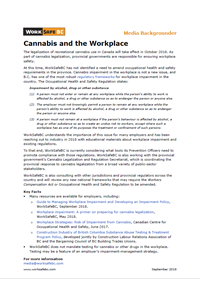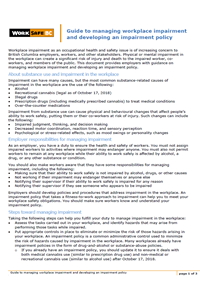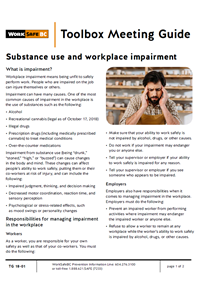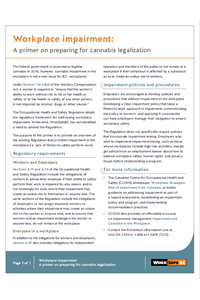Substance use & impairment in the workplace
Workplace impairment as an occupational health and safety issue is of increasing concern to British Columbia employers, workers, and other stakeholders.
Physical or mental impairment in the workplace can create a significant risk of injury and death to the impaired worker, co-workers, and members of the public.
Impairment can have many causes, but the most common substance-related causes of impairment in the workplace are:
- The use of alcohol or legal drugs (which includes cannabis as of October 17, 2018)
- The use of illegal drugs
- The use of prescription drugs to treat medical conditions
- The use of over-the-counter medications
Effects in the workplace from substance-use impairment
Impairment from substance use can cause physical and behavioural changes that affect a person's ability to work safely. These changes can include:
- Impaired judgment, perception, and decision making
- Decreased motor co-ordination, reaction time, and sensory perception
- Psychological or stress-related effects, such as mood swings or personality changes
Responsibilities for managing impairment
Workers and employers share responsibility for managing impairment in the workplace.
As a worker, you must tell your supervisor or employer if your ability to safely perform assigned work is impaired for any reason. If you have a physical or mental impairment, you must not do work if the impairment may create a risk to yourself or anyone else.
As an employer, you must not assign impaired workers to activities where impairment may create an undue risk. You must also not permit workers to remain at any workplace while their ability to work safely is affected by alcohol, a drug, or another substance or condition.
Employers are encouraged to develop policies and procedures that address impairment in the workplace. An impairment policy that takes a fitness-to-work approach to impairment can help you to meet your workplace safety obligations. You should also communicate your impairment policy clearly to workers.




